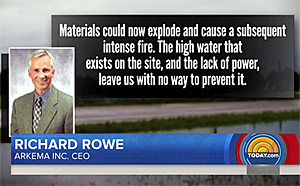


Hurricane Harvey: Chem Plant Crisis Communications
[by Howard Fencl, Hennes Communications]
The catastrophic after-effects of Hurricane Harvey continue to claim lives, destroy property, and wreak havoc across Texas and the gulf coast at this writing. Today, floodwaters have touched off reports of explosions and fires at Arkema, a French specialty chemicals and advanced materials company with facilities now underwater in Crosby, Texas. Rich Rowe, the company’s CEO, has taken an aggressively proactive and transparent approach to communicating about what could become an even greater catastrophe at the flooded plant:
“Our Crosby facility makes organic peroxides, a family of compounds that are used in everything from making pharmaceuticals to construction materials. But organic peroxides may burn if not stored and handled under the right conditions. At Crosby, we prepared for what we recognized could be a worst-case scenario. We had redundant contingency plans in place. Right now, we have an unprecedented 6 feet of water at the plant. We have lost primary power and two sources of emergency backup power. As a result, we have lost critical refrigeration of the materials on site that could now explode and cause a subsequent intense fire. The high water and lack of power leave us with no way to prevent it. We have evacuated our personnel for their own safety. The federal, state and local authorities were contacted a few days ago, and we are working very closely with them to manage this matter. They have ordered the surrounding community to be evacuated, too.”
Arkema is extraordinarily frank in its communications, and in no uncertain terms has warned the public to expect further fires and explosions. The language on its web site pulls no punches:
“Any fire will probably resemble a large gasoline fire. The fire will be explosive and intense. Smoke will be released into the atmosphere and dissipate. People should remain clear of the area.”
The company doesn’t minimize risks to public health in its communications:
“The fires from the burning organic peroxides will emit thick black smoke. The smoke might be irritating to the eyes, skin and lungs…if you feel that you have been affected by any smoke from this incident, please contact your doctor or otherwise seek medical attention.”
And the company makes no promises it can predict what dangers may develop in the coming days:
“With respect to potential impacts on nearby property, that depends upon what happens at the site, which we can’t predict right now. As we get more information, we will provide it.”
In a crisis this grave, Arkema has done precisely what any business should do in communicating about a cataclysm of this magnitude:
- Anticipate future risks based on the company’s understanding of the situation, warning people that conditions will likely change as issues develop.
- Admit uncertainty, warning that some of the scenarios they anticipate may turn out to be wrong. But assuring that as the company knows more, it will communicate it.
- Tell the unvarnished truth without patronizing or insulting audiences by minimizing the situation.
- Communicate action steps telling people impacted by the crisis who they should call for help.
- Display sincere humanity. In his statement, the CEO apologizes to first responders for “impacting their lives” and thanks them for their work, “their guidance, professionalism and dedication.”
News coverage is ongoing and extensive – and the company is quoted frequently in media reports. Bottom line: Arkema got out in front of the story, communicated proactively and genuinely, and have committed to updating its key audiences and the public until the situation is resolved.
No sugar coating. No spin. This is crisis communications at its finest.
Update, September 19, 2017
“Days after the fires, a group of first responders who had been assigned to monitor the 1.5-mile perimeter of the evacuation area around the Arkema chemical plant sued the company, claiming that they had been unprepared for the wave of smoke that had left them vomiting and gasping for air in the middle of the road. In their lawsuit, the responders allege that the plant owner, Arkema, downplayed the dangers of exposure to the fire and failed to adequately warn responders to move farther away from the fumes after the first of nine trailers full of volatile organic peroxide caught fire.”
“We reject any suggestion that we failed to warn of the danger of breathing the smoke from the fires at our site, or that we ever misled anyone,” Arkema said in a statement. ” To the contrary, we pleaded with the public, for their own safety, to respect the 1.5 mile evacuation zone imposed by the unified command well prior to any fire. We will vigorously defend a lawsuit that we believe is gravely mistaken.”
Was Arkema completely forthcoming, as it appeared during the unfolding crisis? That will now be decided in a court of law. We’ll keep an eye on this one and report back.